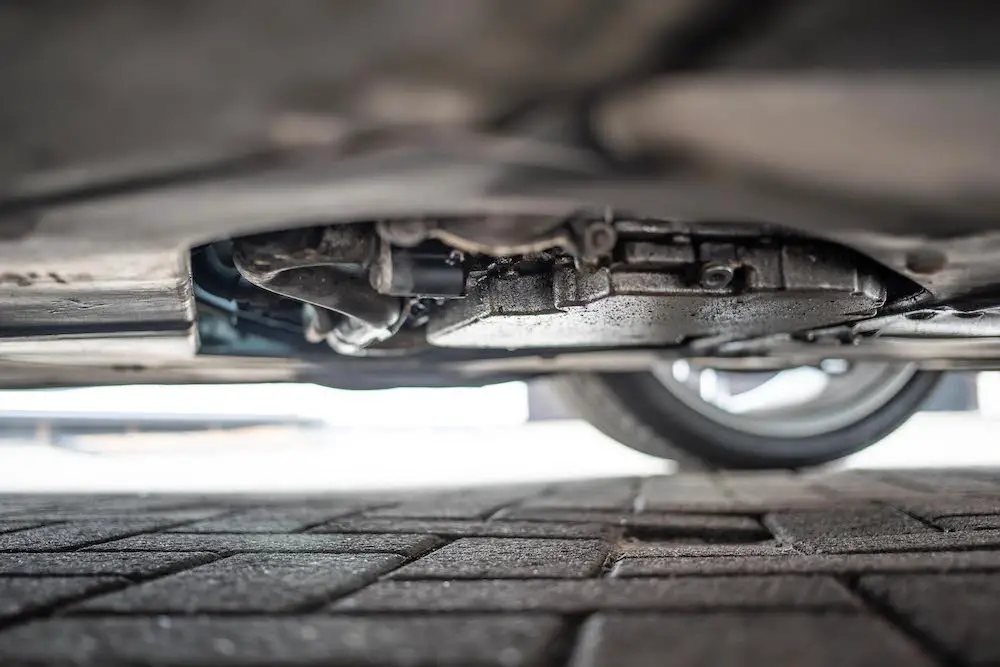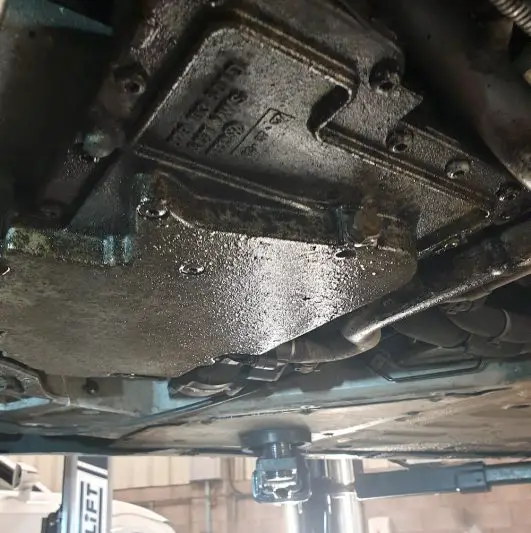In terms of car maintenance, changing your oil is one of the most important and simplest things you can do for your vehicle. The use of high-quality, clean oil in the engine helps to prevent excessive friction. Maintaining oil in the engine avoids corrosion by keeping any vital components from rubbing against each other. Otherwise, you’ll be asking yourself, “Why is my car leaking oil?”
As oil becomes contaminated, it loses its effectiveness, causing essential parts to wear out. Your check engine light may illuminate if it has been a long time since you had an oil change, or you may notice a leak in extreme cases. Even seeing a pool of oil under your vehicle after running an errand can be surprising. Please continue reading to learn more about why is my car leaking oil.
What Type Of Leak Is It?
Before you do anything else, check to see whether your car is leaking engine oil or any other type of fluid. To identify why is my car leaking oil, first determine the color of the oil puddle. This will allow you to detect what type of oil is leaking from your vehicle.
- An engine oil leak is indicated by brown fluid.
- It’s most likely transmission fluid if the oil is red.
- Coolant is most likely a green or orange liquid with a sweet odor.
Importance Of Keeping The Oil Level At A Safe Level
Make sure you check the oil and fluid levels in your car as soon as you notice the leak. To keep your car lubricated and operating smoothly, check and maintain the oil and fluid levels regularly.
Examine the dipstick for engine oil. If it’s too low, top it up to ensure the engine can run safely, or check your transmission fluid dipstick (with some help from how to read oil level on dipstick) if you have a transmission fluid leak. Otherwise, your radiator may be leaking coolant. Check the fluid level and verify if the liquid reaches the full line on the reservoir’s side.
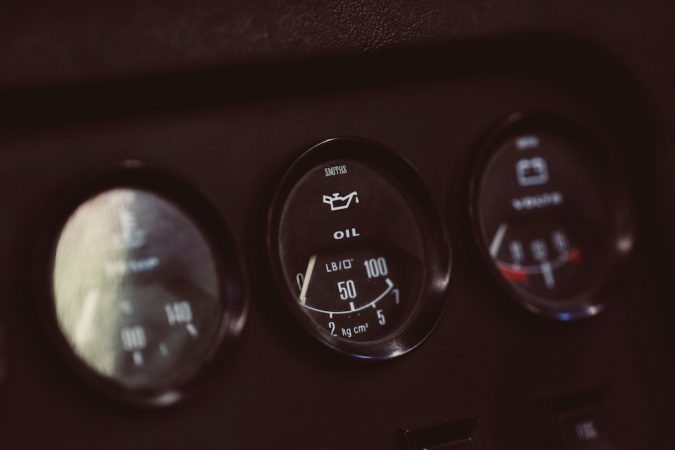
If necessary, top up any of these oil and fluid levels before driving your car. A hot engine, however, should not have coolant injected into it. To avoid getting damage to your engine, wait until it cools down.
What Does Oil Do For Your Car’s Engine?
Motor oil, also known as a lubricant or engine oil, is a vital component. Your engine would quickly fail if you didn’t have it. What effect does oil have on your engine? Motor oil’s principal function is to lubricate all of an engine’s moving metal parts. It coats the pistons, cylinder walls, valves, and other parts in a thin layer to prevent them from colliding.
Neither your valves nor your camshaft should come into direct touch with their guides or bearings. These internal components must be insulated from one another by a relatively thin layer of oil to decrease friction.
Heat is also control by motor oil. The oil acts as a lubricant, allowing elements of your engine to slide readily even when they are close together. It also absorbs some of the heat when it comes into touch with the metal pieces. Furthermore, motor oil contains unique components that minimize friction, increase viscosity, and clean your engine.
When your car isn’t running, the oil collects in an oil pan at the engine’s bottom. An oil pump, similar to your heart, distributes oil throughout the engine after it starts.
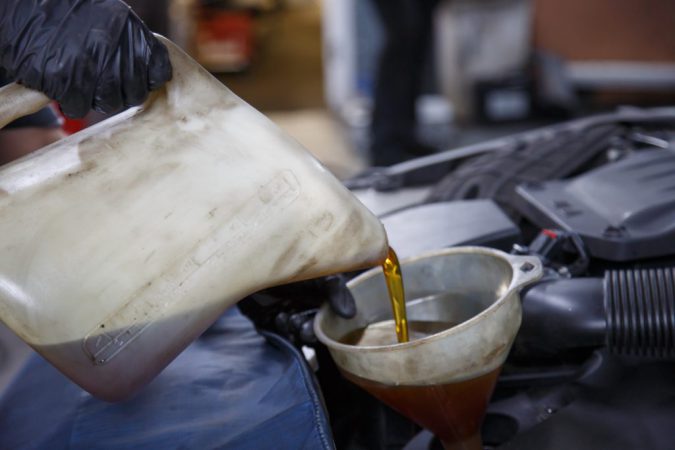
Oil constantly pumps through your engine, eventually returning to the oil pan to cool. An oil filter removes particles or other pollutants along the road, much like your kidneys clean your blood.
Motor oil has traditionally been extracted and distilled from crude oil pumped from the ground. While “conventional” oil is still widely used, vehicle manufacturers gradually replace it with synthetic oil made artificially in a lab.
Synthetic motor oil has a lot of advantages since it is meticulously manufactured from high-quality base stock. Your engine must run with the right amount of clean motor oil, regardless of the type of oil it uses.
Locating The Origin Of Your Oil Leak
Depending on the type of fluid, there are three possible origins for your leak:
- Engine Leak – Engine Oil
- Coolant – Radiator Leak
- Coolant – Cooling Lines
Once you’ve located the source, you’ll need to dig deeper to determine which component is producing the leak. An oil leak can come from various sources, but the most likely ones are gaskets and oil seals.
Why Is My Car Leaking Oil?
One of the most prevalent sources of oil leakage in cars is the oil pan gasket. However, the oil pan gasket may not be the only one leaking oil. A timing belt cover or camshaft seal leak could also be the source of the problem. A variety of factors could cause an oil leak. Nonetheless, these are the common reasons your car could be leaking oil.
Reasons Of Why Is My Car Leaking Oil
Failed engine gaskets and worn O-rings or seals that shrink and harden for a long time, temperature, and strain are the most common causes of oil leaks. This creates the ideal conditions for an oil leak. The most likely causes are the oil pan drain plug, oil filter, or rocker (valve) cover gaskets. So let’s take a look at these and other reasons why is my car leaking oil.
Lack of maintenance is the most common cause of gasket and seal failure. Oil breaks down when it is left too long between changes, causing old oil to get polluted by condensation and combustion by-products.
Acids form in the oil as it becomes saturated with contaminants. Gaskets and seals are attacked and degraded by these acids, resulting in oil leaks. Your mechanic should always check out any leak. Repairing leaks now will save you money in the long run.
O-Rings, Gaskets, And Seals
Gaskets and seals keep oil where it belongs in your engine while keeping dust, debris, and moisture out, which can cause oil breakdown and early engine damage. If these gaskets and seals fail, the oil will flow.
Here’s where you’ll see the oil leaking:
- On top of the engine, look for dirt and muck buildup, as well as small pools of oil around the cylinder head indents and spark plugs. Check for oil patches or drip stains beneath the engine’s center, as well as a burning oil odor. These leaking gaskets are a common source of oil leaks, and they’re simple to spot and fix.
- You’ll notice oil seeping from the front or middle of the engine if the front and timing cover gaskets and seals are damaged.
- Oil will drop out between the engine and the transmission if the top of the engine is dry, and the flywheel will cover in oil. To confirm the leak in this scenario, the transmission inspection cover must be removed.
- A faulty camshaft seal located at the back of the cylinder head will leave oily residue beneath the rocker cover.
- An oil pan gasket can leave drips anywhere under an engine, making it difficult to diagnose a faulty oil pan gasket. Oil will drip over the oil pan from any other leaking engine gasket or seal. Your mechanic must confirm the leak is caused by the oil pan gasket and not by oil from another source.
- If oil is pouring from the oil filter location, inspect the filter and the mounting adapter gasket. Not only may overtightening damage the oil filter gasket, but it can also damage the adapter gasket.
- A head gasket can create an exterior oil leak, frequently misdiagnosed as a rocker cover or camshaft seal leak. White smoke will most likely come out of the exhaust pipe, suggesting that coolant from a blown head gasket is causing some smoking in the combustion chamber.
- A loose, unstable, or fractured dipstick tube can cause a significant oil leak. If your dipstick is loose or its mounting bracket is broken or missing, get it repaired as soon as possible so you can check your oil.
Oil Leaks from Other Sources
- Oil flow units can create a slow leak or gusher because they are inserted directly into the engine’s oil pressure system. An oil transmitting unit is faulty if the oil light flashes or the oil pressure readings are incorrect.
A malfunctioning circulation system in a contemporary car might give erroneous low oil pressure data to the engine computer, causing the engine to shut off for no apparent cause.
- The oil pan may leak if a puncture is caused by road debris or driving over a curb.
Overtightening the oil pan drain plug or oil filter might break the gaskets during an oil change, allowing oil to flow out. The threads on the oil pan drain stopper might be damaged if you overtighten it.
Although you may need entirely new oil, replacing the drain plug is an easy remedy. If the threads inside the oil pan, on the other hand, are torn, you’re looking at a pricey repair.
- A faulty, jammed, or clogged PCV valve can create a slew of problems. One is an increase in internal engine pressure, which causes one or more engine O-rings, gaskets, or seals to fail.
Inadequate Installations
- If you overtighten a gasket and crush it or don’t tighten bolts tight enough or in the correct sequence, the oil will leak.
- When replacing an oil filter, this oil filter “double gasket” is a common mistake. The old gasket for the filter adheres to the engine, and the new filter and gasket are fitted on top of it. This frequently leads to severe oil loss in the engine.
How Can You Tell If You Have An Oil Leak?
Oil leaks in cars manifest themselves in some ways. Some of the symptoms can be found by simply glancing around:
Spills Of Oil
The most visible symptom of an oil leak is an oil spill. If your vehicle is leaking, it will cause a spill or splatter underneath it. You might observe a few droplets or a small puddle, depending on the severity of the leak. Whatever the case may be, an oil spill just beneath your vehicle indicates that your engine oil is leaking. And it would help if you had it checked out right now.
Oil With A Different Appearance
Please take a look at the color and texture of the oil when you’re checking it. It should be dark brown or black, slightly transparent, and greasy in texture. It could be a blown head gasket if the color is paler, more opaque brown, and the texture is more creamy and frothy.
Oil and coolant seep into one another when this happens. A blown head gasket can ruin an engine if it’s not fixed right away.
Engine Oil Check Light Is On
Another symptom of an oil leak is if your dashboard’s check engine oil light is illuminated. It is ideal for oil leaks because it only lights up when the oil level is too low. If the light comes on while you’re driving, you should pull over to the side of the road and inspect your car. Check for oil leaks if your car lights up when you switch it on.
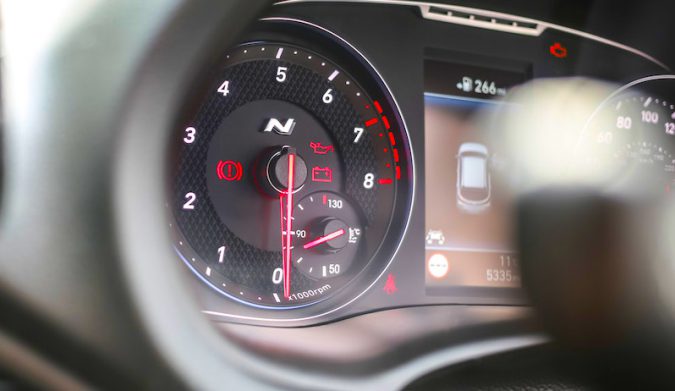
Engine Exhaust Fumes
Smoke emanating from the engine might be produced by many factors, including a faulty cooling system, wiring problems, or fluid leakage. When transmission fluid, brake fluid, or engine oil seeps onto a hot engine component, it can cause smoke.
If you notice your engine is smoking, pull over to a safe location. Please turn off the engine and wait for it to cool down. Then, pop the hood to see what’s wrong. Also, only use the fire extinguisher if flames are visible. Otherwise, the fire extinguisher will cause more harm than good.
Engine Overheating
Engine oil serves as both a lubricant and a filter, as well as a coolant. It circulates through the various components of the engine, cooling it down. In the event of an oil leak, the oil level drops as the cooling effect reduces. The engine may overheat as a result of this.
The Smell Of Burning Oil
Oil seeping from the valve cover has the potential to contaminate other engine components. They also emit a burning oil odor because they are boiling when driving. It’s definitely burning oil under your hood if you smell something unpleasant.
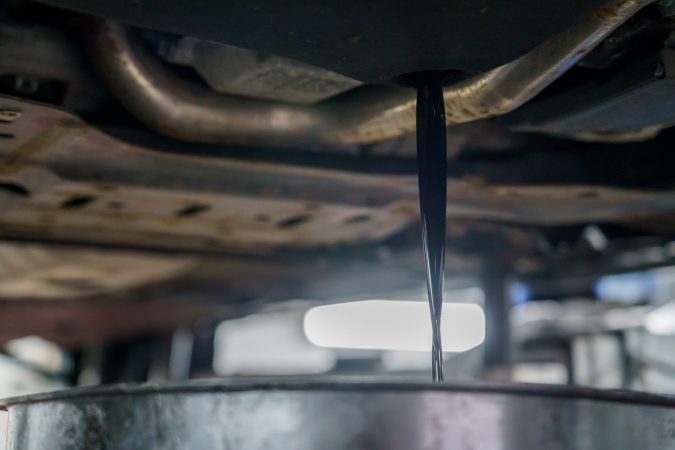
Low Level Of Oil
How often do you check the oil level in your car? It’s a good idea to keep an eye on it frequently. It’s a quick and easy chore that can save you a lot of money if you discover a problem early. Locate the oil dipstick and remove it to check the oil level. This is a yellow loop with an oil icon that resembles a genie lamp on most modern autos.
Remove the dipstick and wipe it down with a rag before reinstalling it to get an accurate reading. Remove it once more and check how far the oil has risen the dipstick. If it’s below the minimum fill line, your engine is low on oil, and there could be a leak. Adding additional oil can help you avoid disaster in the short term, but it’s not a long-term solution.
How Do You Stop An Engine Oil Leak In Your Car?
Fixing the problem may be straightforward, depending on the source of the oil leak.
To begin, identify the issue. Tighten the oil filter or drain plug if the leak is coming from there. You should constantly be mindful of hot engine parts and make sure the car is in the park, the emergency brake is engaged, and that it’s safe to look inside or beneath your vehicle before you do anything.
Next, consider using a “stop oil leak” additive for an older automobile with a leaky gasket. This liquid is mix into the engine oil and aids in the expansion of any seal gaps. This is not a long-term treatment, but it can be a useful short-term fix.
Complex oil leak issues, such as a damaged oil pan or valve cover seals, should be handle by a mechanic. If you’re unsure what to do about a car problem, seek the advice of a professional mechanic.
When There Is An Oil Leak, What Should You Look for?
While there are a variety of causes for oil leaks, determining the source is very simple. You may quickly find the source of the oil leak by inspecting a few spots. Begin by:
- Searching for any signs or symptoms. Find out where the oil spill is coming from and how severe it is. Is there smoke or a burning odor if there aren’t any oil spills? An oil leak in the engine bay can cause both of these things. Oil leakage and low oil levels are two common causes of engine overheating, so keep that in mind.
- Check beneath the vehicle if there is an oil spill. Check for leaks in your oil pan or drain plug. Cleaning the oil and checking in again after some time is an easy way to validate this. If you see additional oil, it’s most likely due to your oil pan or drains plug problem.
- Your engine is another area to look at. Look under the hood to see if there are any oil streaks. If you can’t find it, look around your valve cover or the oil filter. The problem is if there is oil immediately beneath the filter.
Can I Drive A Car With An Oil Leak In The Engine?
While a few drops of leaking motor oil may appear little, they could be a precursor to something more serious. Check the engine oil level after observing spilled oil. Before starting the engine, apply oil if necessary. Drive to an auto repair shop if the level is acceptable. If there is a significant amount of oil spill, you should have your automobile towed to a mechanic.
How Can Oil Leaks Be Prevented?
Regular maintenance and oil changes are required to keep your car’s engine in good working order and avoid any oil leaks. To maintain a slight underpressure in your car’s engine, clean the crankcase ventilation lines and control valves regularly. Overpressure tears the seals, resulting in oil spills. It’s also possible to use special additives that are effective and aid in reducing oil leaks.
What If It’s Not Motor Oil?
It’s not always the case that fluid dripping from your vehicle is motor oil. Just because something appears like engine oil doesn’t imply it is. There are many fluids in your car, and it might be difficult to tell them differently, especially once they’ve struck the ground.
If you notice a puddle underneath your car, the best way to tell if it’s an oil leak is to examine the fluid’s hue. It’s most likely water draining from your vehicle’s air conditioner system if it’s clear. It’s probably coolant if it’s a bright green, pink, orange, or blue color. This type of fluid has a sweet odor, making it simpler to detect.
Brake fluid is often a translucent yellow or brown fluid. It’s most likely transmission fluid if the fluid is brown with a reddish hue. Because power steering fluid can also be red, many people mistake it for transmission fluid. The hue of engine oil is pale brown or black. If you notice a light brown or black liquid puddle, it means your car is leaking oil.
Transmission fluid, brake fluid, and coolant, for example, are all present in your vehicle. There is also power steering fluid, differential fluid, and transfer case fluid in many automobiles. And due to worn or broken parts, all of those fluids have the potential to leak.
When your car develops a leak, you don’t want to jump to conclusions. Visit a professional as soon as possible to leak diagnosed and repaired. Taking care of the issue can keep your car safe and clean.
Is It Expensive To Repair An Oil Leak?
The cost of repairing an oil leak varies based on the underlying problem that caused the leak.
For example, replacing the oil pan gasket could set you back a few hundred dollars. A timing belt oil leak, on the other hand, will be more expensive to fix. Because prices might vary greatly, it’s usually a good idea to inquire for an estimate.
Facts about Car Oil Leaks
- Regularly changing the oil in your car is important to prevent friction, corrosion, and mechanical failures caused by dirty or contaminated oil.
- A common sign of an oil leak is a puddle of greasy-looking brown liquid under the car after it has been parked for a while. However, some vehicles have shielding underneath that can hide oil leaks.
- An engine covered in oil is another sign of an oil leak, and the oil can also get in contact with hot engine surfaces, causing it to burn and emit a smell.
- Oil leaks are often caused by degraded engine gaskets or oil seals, which can erode over time due to old, dirty oil. Damaged oil gaskets or pans, incorrect installations, and bad rings or valve seals can also cause oil leaks.
- It is urgent to stop an oil leak as it can cause major damage to your engine. Take your vehicle to a mechanic immediately if you suspect an oil leak.
- To prevent oil leaks, change your oil as often as the manufacturer recommends, which can be found in your owner’s manual or by calling your local dealership. Don’t wait until you see signs of an oil leak or the “low oil” light comes on.
- Your manufacturer’s recommendation for oil changes will involve mileage, which is a more reliable gauge than a timeframe. All cars are different, but newer cars can often go 7,000 to 10,000 miles between oil changes.
- Simply changing the oil will not fix an oil leak. You’ll need to identify the cause of the leak, conduct the necessary repairs, and then top off or change the oil as needed.
- The severity of an oil leak depends on several factors, such as the location and size of the leak. A major oil leak can cause serious problems, but short-distance drives of less than 10 miles are less risky.
- Properly identifying the underlying cause of an oil leak is crucial, and it’s best to take your car to a mechanic rather than using DIY leak-stop products. The cost of fixing an oil leak will depend on the type of vehicle, engine, and location of the leak.
Final Verdict – Why Is My Car Leaking Oil?
Have you ever noticed oil on your garage floor after leaving your car parked overnight?
Engine oil leaks can be harmful to the environment and, if the oil is leaking near a hot exhaust pipe, it might cause your car to catch fire.
It’s not always the case that fluid dripping from your vehicle is motor oil. It’s not engine oil just because it looks like it. It can be challenging to distinguish between the fluids in your car, especially once they’ve struck the ground.
If you notice a puddle underneath your car, the best way to tell if it’s an oil leak is to examine the fluid’s hue. The hue of engine oil is pale brown or black. If a puddle is of light brown or black liquid, it means your car is leaking oil. This guide can also help you figure out why is my car leaking oil.

